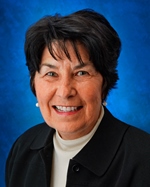
New officers include: Mary Gonzales, president; Robert L. Milan Sr., vice president; Tom Groneman, secretary.
Before being elected board president, Mary Gonzales served as vice president. She has been on the BPU Board of Directors since 2001.
Gonzales retired from teaching school in 2006 after a 33-year career. For many of those years she was an eighth-grade language arts teacher at Piper Middle School.
She served as president from 2005 to 2007. She also served previously as vice president and secretary of the BPU board.
Besides her BPU Board and other community activities, she serves on the Board of Directors of El Centro and City Vision Ministries. She also is a member of the American Public Power Association and the American Water Works Association. A graduate of Leadership 2000, she was also District 5 coordinator in the successful effort to consolidate the Wyandotte County-city governments, and served on the advisory board of the Wyandotte County Library. In addition, she is past president of Delta Kappa Gamma International Educational Society.
Gonzales has a Bachelor of Arts degree in education from the University of Montevallo in Montevallo, Ala., and a master’s degree in curriculum and instruction from Emporia State University. She is married to John Mendez and has three sons and two step-daughters.
Other elected officers include Robert L. Milan, vice president and Tom Groneman, secretary. Milan has served on the board since 1991. Groneman has served on the board since 2013. Both Milan and Groneman will work closely with Gonzales in their new roles.
